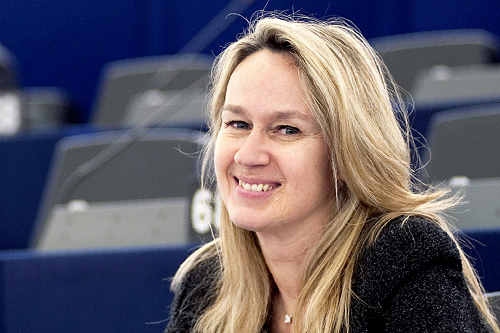Le Grip: "Women refugees run the risk of being trafficked and sexually exploited"
Life in a refugee camp can be hard, especially if you are a woman or a child. A delegation from the women's rights committee visited camps and centres for refugees around Athens on 3-4 November to assess their situation. Following the mission we spoke to the head of the delegation Constance Le Grip, a French member of the EPP group. She called on EU countries to live up to their commitment to take in more refugees, especially women and children.

Constance Le Grip
How is life as a refugee harder for women than for men? What are the main challenges they face?
The insecurity and dangers threatening female refugees and migrants’ physical and psychological integrity are a lot more significant that those facing men. They run the risk of being sexually exploited and being taken by human trafficking networks. And this could also happen once they have arrived in the EU, including in camps.
There is not enough security and surveillance. They don’t always have the possibility to shut themselves away and there are no separate bathrooms. Staff members have told us about the high levels of domestic violence to which women are exposed.
How are unaccompanied minors being looked after?
Most of them live in general refugee camps. Certain camps try to group these minors together. Girls are especially vulnerable and experience psychological problems.
Many young people don’t like staying in the camps long. They don’t always understand why they have to be accompanied and supported and often slip away from the camps. As a result they are even more exposed to danger.
Greece urgently needs other EU countries to show their solidarity, in particular by taking in more minors. Because at the moment the conditions in Greece for looking after them are not very good.
You visited a centre for women who were the victim of violence. What impressed you the most?
We didn’t meet the victims themselves, but we had discussions with the management team. They told us that the women in the shelter had demonstrated an enormous willpower and energy and provided they were well supported and advised, would be able to tackle the challenges they are faced with. They are also driven by a lot of a hope and a willingness to cope and join the labour market.
Is it possible to evaluate the extent of the human trafficking problem?
We don’t have any statistics as it is very difficult to trace. The European directive regarding this is either not correctly transposed into national legislation or not correctly applied, or even not at all
How could the Parliament help to make a difference ?
The Parliament has already called attention to the situation on various occasions, for example by adopting a report proposing a series of concrete measures on International Women’s Day.
We need to constantly remind member states of their commitment regarding relocation where each country has to shoulder its part of the burden. We would also like to see a close look at how funds are spent on the ground.
Source: European Parliament
- 379 reads
Human Rights
Fostering a More Humane World: The 28th Eurasian Economic Summi

Conscience, Hope, and Action: Keys to Global Peace and Sustainability

Ringing FOWPAL’s Peace Bell for the World:Nobel Peace Prize Laureates’ Visions and Actions

Protecting the World’s Cultural Diversity for a Sustainable Future

Puppet Show I International Friendship Day 2020

